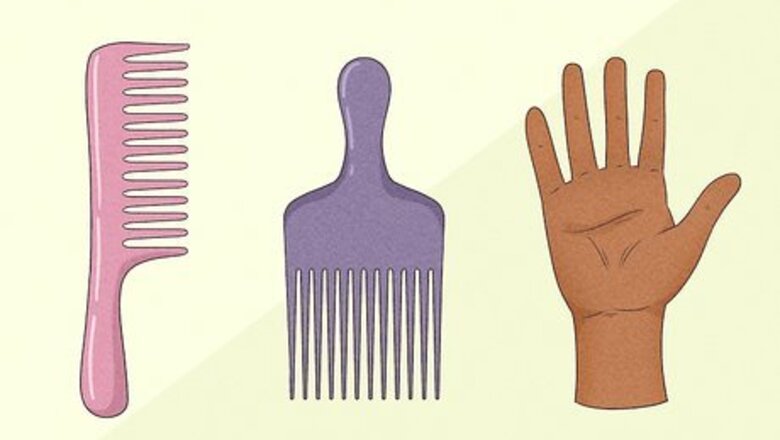
views
Protecting Your Hair from Damage
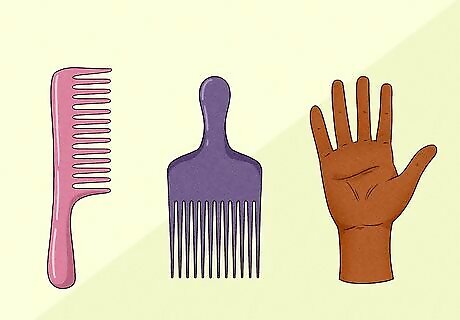
Use the right comb. Traditional combs and brushes will damage your curly hair, making it frizzier. Instead of these, use a wide-tooth comb, afro pick, or even your fingers to comb your hair. Don't comb more than necessary! Just use your comb, pick, or fingers to get rid of any tangles. If you have a lot of tangles, try buying a detangling spray specifically designed for African American hair. This will make combing much easier and more pleasant.
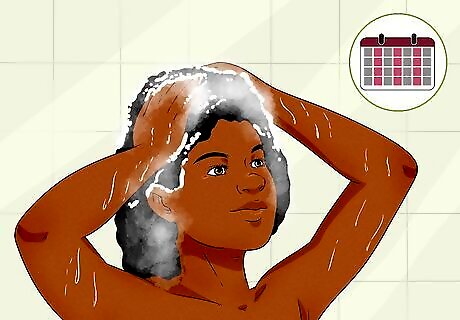
Avoid washing too often. Very curly hair tends to be prone to dryness, which means you do not have to wash it as often as you would if you had oily hair. Try to shampoo your hair three times per week (or even less if you can without it becoming oily) to prevent over-drying. While you should avoid over-washing, it is important to wash often enough to keep your hair and scalp clean. The exact frequency that is right for you will depend on your hair type and the amount of oil in our hair and scalp. Be careful about what kind of shampoo you use, as many common ingredients can can breakage. Try to avoid shampoo that contains sulfates, polysorbates, isopropyl alcohol, formaldehyde, hydrolyzed collagen, parabens, propylene glycol, or polyethylene glycol.
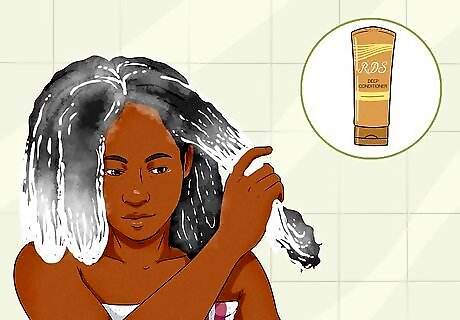
Deep condition. After you wash your hair, you should apply a deep conditioner to help keep your hair soft and healthy. You will need to leave the deep conditioner in your hair for an extended period of time before rinsing to ensure that it penetrates the hair shafts. If you are buying a deep conditioner at the store, look for one that contains ingredients like cationic surfactants, cationic polymers, emollients, oils, and silicones. You can also make your own deep conditioner. You can find tons of different recipes online, but common ingredients include mayonnaise, avocado, aloe vera, shea butter, glycerin, coconut oil, argan oil, olive oil, jojoba oil, eggs, and honey. Try not to massage the deep conditioner into your scalp. This can cause flakes. For the best results, you should cover your hair with a plastic cap while it is wet and apply heat to your hair while the deep conditioner is in. You can do this by sitting under a blow dryer hood for 20-30 minutes or by wrapping your hair in a hot, damp towel for up to two hours. If you use the towel method, you will need to remove the towel and run it under hot water frequently to keep it hot. If you don't apply any heat, you should let the deep conditioner sit on your hair for much longer.
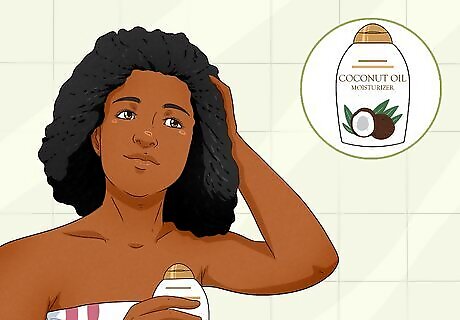
Moisturize your hair. Moisturizing is absolutely essential to maintain a health afro. There are tons of moisturizing products out there for African American hair, so you may have to do some experimenting to find the best ones for you. Water adds moisture to hair, but only if your hair can absorb it. Try using an oil that penetrates the hair, such as coconut oil, avocado oil, or olive oil, on damp hair to help your hair hold on to that water. When styling your hair, finish it with a sealing cream or oil that will lock in moisture. Castor oil, shea butter, grapeseed, and jojoba oil are all good choices.
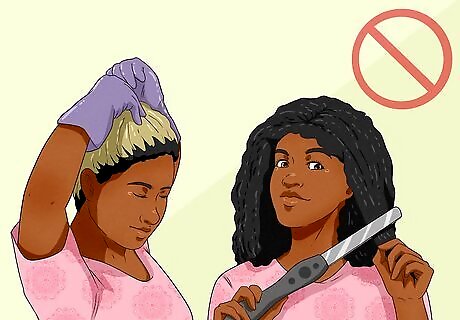
Avoid over-styling. If you feel like your hair just does not grow, the problem may be that you are over-styling it, causing it to break. Try being gentler on your hair by avoiding harsh treatments as much as possible. Chemical treatments like coloring and relaxing can cause your hair to break, which means it will not grow as fast, so avoid these if you are trying to grow your hair out. Heat treatments like flat irons, curling irons, and blow dryers can be just as damaging, so use them as little as possible.
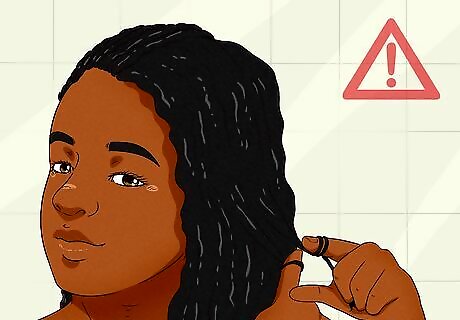
Be careful with protective hairstyles. Many people choose to wear their hair in protective styles like braids or twists while they are trying to grow an afro and once their afro is grown to the desired length. These can be beneficial because they protect the ends of the hair from damage. They also offer a convenient way to style your hair when it is an awkward length. It is, however, possible to damage to your hair with these styles, so be careful. Make sure your hair is not braided or twisted too tightly. If it is painful for your scalp at all, it is probably damaging your hair as well. Don't leave the protective style in for longer than four weeks at a time. It's better if you can take it out even sooner. Continue moisturizing your hair on a daily basis even if it's braided.
Growing Your Hair Out
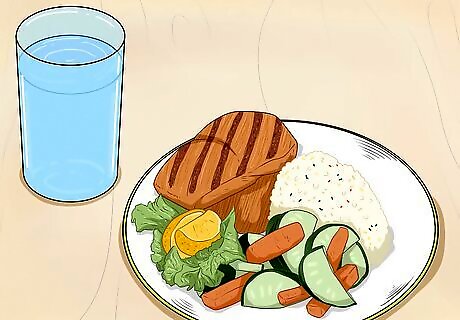
Take care of yourself. Your hair will grow faster and be stronger if you are healthy. Start from the inside out to grow long, healthy hair. Foods that are rich in protein, iron, biotin, and zinc are known to promote hair growth. Vitamins A and B are also essential for healthy hair. Try to incorporate more of these nutrients into your balanced diet. Staying hydrated is also very important. If your body doesn't have enough water, your hair will become drier and more brittle.
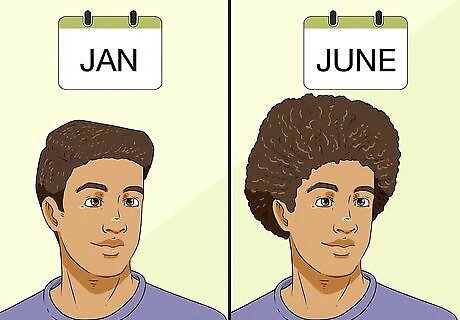
Be patient. It may take many months for your hair to grow long enough for you to have a true afro, so you need to wait it out. Hair typically grows about 1/2 inch each month, but this can vary from person to person. The curlier your hair, the longer it will take to grow out your afro. Don't give up because you will have the hairstyle you want eventually! Everyone's hair grows in natural cycles, so there are times (typically a few weeks out of every several years) when growth is dormant. There is nothing you can do to make your hair grow during a dormant period, so just be patient and know that it won't last long.
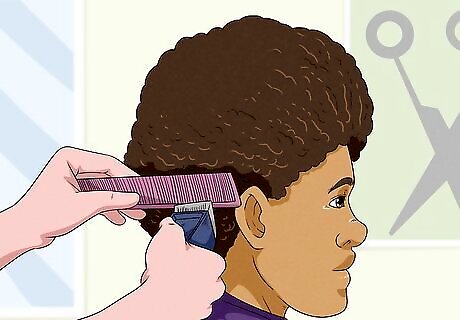
Get a trim. Trimming your hair won't make it grow any faster, but it will keep it looking neat and tame. If you see that the ends of your hair are beginning to show signs of damage, it's time for a trim, no matter how bad you want that length! While hair care products may help prevent new split ends from forming, nothing can repair existing split ends. They must be cut off.
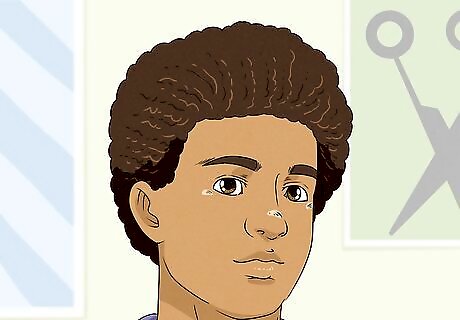
Enjoy your new look. Once you have the afro you've always wanted, enjoy it! If you want to keep it looking great, remember to keep taking care of your hair the same way you did when you were growing it. It's still just as important to keep your hair nourished, moisturized, and free from damage.
Styling Your Afro
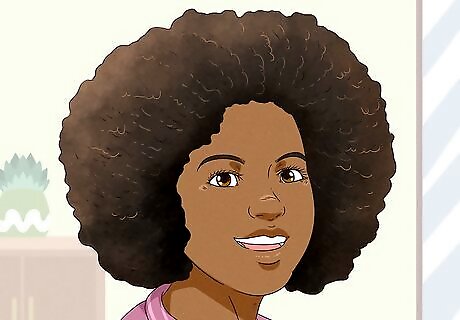
Go natural. Once you've washed and moisturized your afro, you don't need to do much more to style it. Avoid styling products and blow dryers as much as possible. Prevent frizz by always wrapping your hair in a silk scarf before bed. This will help ensure that your afro keeps looking good without the need for heat styling or additional products.
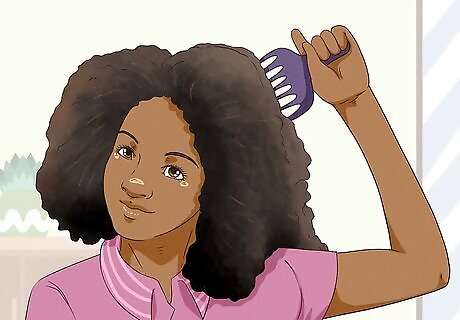
Comb your afro. If you want a fuller afro, you should comb it after applying your moisturizer. This will help detangle your curls and make your afro nice and full. Be sure to use a wide-toothed comb or an afro pick instead of an ordinary hair comb. Be very gentle while combing. Work in small sections and run the comb from the root of the hair to the ends. Combing every day is not a necessity, especially if you have a shorter afro. Avoid combing more than you need to in order to get your desired volume, as over-combing will just cause damage.
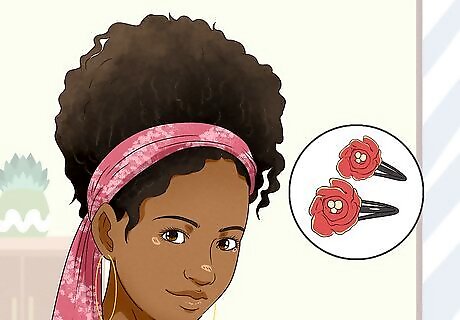
Add some adornments. If you're a woman, consider adding some extra style to your afro with adornments like clip-in flowers, headbands, or scarves. You can use simple accessories or bold ones, depending on your own personal style.
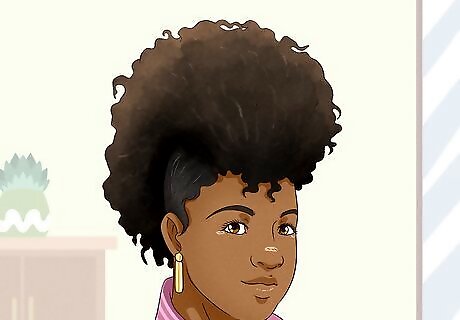
Consider a faux hawk. If you want to switch up your look, a faux hawk can make your afro look extra stylish. This works especially well with medium-length afros. Use a hair gel or similar product to slick back the sides of your afro, leaving the top free. You can also get cornrows on both sides of your head, leaving just the top of your afro loose.




















Comments
0 comment